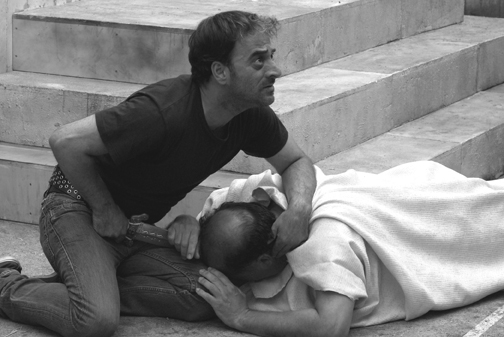
Brutus (Salvatore Striano) in CAESAR MUST DIE)
Paolo and Vittorio Taviani’s latest film, a spry, lean, and limber 76-minute feature, is the dictionary definition of high concept: an adaptation of Shakespeare’s Julius Caesar set in a maximum security prison using actual inmates as actors. Caesar Must Die netted this sibling directing team, now in their 80s, their latest garland: the Golden Bear at the 2012 Berlin International Film Festival. While there were heated debates about whether this film was truly worthy of such a high honor, taken on its own merits one can see why it gained such high profile support.
It is a deceptively simple blending of fictional and documentary elements that gradually and subtly reveals layers of fascinating interplay between different modes of narrative, blurring the lines of what’s “real” and what isn’t, raising crucial moral questions along the way. While the brief length has the effect of glossing over many aspects of the play’s story and the circumstances of its making that would give the film more depth, what remains is an intriguing study of the effects classic literature and great art has on those who participate in its re-creation.
The setting, Rome’s Rebibbia prison, houses many members of the Mafia and Camorra as well as drug traffickers, a good number of whom are serving life sentences for murder and other crimes. The play is staged not only in the prison’s theater but also in various areas of the prison. Rebibbia becomes a stage unto itself in the Tavianis’ depiction of the rehearsals for the big performance.
The film begins and ends with an excerpt of the inmates’ staged performance in front of a very appreciative audience. The final scenes of Julius Caesar, depicting the death of Brutus, are performed by the inmates with appropriate pathos and grand gestures, and filmed in color. After they take their curtain calls, the prisoners grimly marching back into their cells, a sequence emphasizing the stark contrast between their brief time as acclaimed actors and the reality of their lives of confinement. After a title card reading “Six Months Earlier,” the film switches to black-and-white, supposedly documenting the lead-up to their public staging of Julius Caesar. As a result, the men’s overall performance is a dual one: they play Shakespearean roles as well as the part of inmates.
However, other than the fact that this is a real prison with real inmates, there is very little that is strictly documentary here. (There is indeed a theater program there overseen by theater director Fabio Cavalli, who we see directing the prisoners.) Almost everything filmed is carefully scripted, both during the rehearsals and in the scenes that seem to give us glimpses into the convicts’ lives.
First and foremost, the very premise of staging Julius Caesar turns out to have been proposed and planned by the Tavianis, although this fact is not mentioned anywhere in the film. Also, though the situation of the actors being actual inmates of Rebibbia is technically true, we don’t find out until the very end that two of the major roles are played by former inmates who were pardoned and returned to the prison for this film. There is even a ringer among the incarcerated actors who isn’t a prisoner at all but an acting teacher in the program. What surrounds the staged prison rehearsals is a cleverly constructed fiction taking on the trappings of a cinema verité documentary. It doesn’t detract from this film’s fascination, but instead leads us to question what constitutes fiction and “reality” in cinematic terms.
One other important issue Caesar Must Die raises is the use of the inmates to illustrate the idea of art and culture ennobling everyone who comes into contact with it, even these hardened and clearly very dangerous individuals. In a montage of the auditions (one of the film’s best passages), some of the inmates do an acting exercise in which they state their name, date and place of birth, and their residence before incarceration. They recite these details in two ways: as though saying a sad goodbye and as an angry, agitated reaction to interrogation. The variety of their accents and manner of speech, as well as their distinct personalities, come through in a witty, effective way. They are lit by the high contrast black-and-white lighting as Roman monuments, almost as imposing figures of granite, bit also with a great respect for their humanity and dignity.
After they are chosen for their roles, a title card re-introduces the actors to us, this time stating their crimes and sentences, and we learn that many of these men are Mafia and Camorra members who have probably committed murder; but no other information or context elaborating their specific offenses are afforded us. This makes it disturbingly easy to forget, as we watch them perform the play, that these are criminals who have hurt people, and not just amateur actors putting on a show.
We are mostly encouraged to feel empathy for them and lament how tough their lives are under confinement, forced to stare at the ceiling all night. The final kicker of the film, following their applauded performance, is a scene in which one of the inmates, alone in his cell, addresses the camera: “Since I got to know art, this cell has become a prison.” He punctuates this with a pained expression as he makes a cup of coffee. Again, this is meant to engender pathos on behalf of the men. However, by leaving specific details of their crimes offstage, as it were, this lets viewers of the hook from truly contemplating the implications of being seduced by the inmates. They are presented as victims of their confinement, obscuring the fact that they are there because they have victimized others.
Notwithstanding this uneasy ethical issue—and its breezy, swift pace that too quickly glosses over what it means to have actual murderers performing a play that deals with as assassination plot—Caesar Must Die is still very entertaining and an often clever approach to adapting Shakespeare.
















Leave A Comment